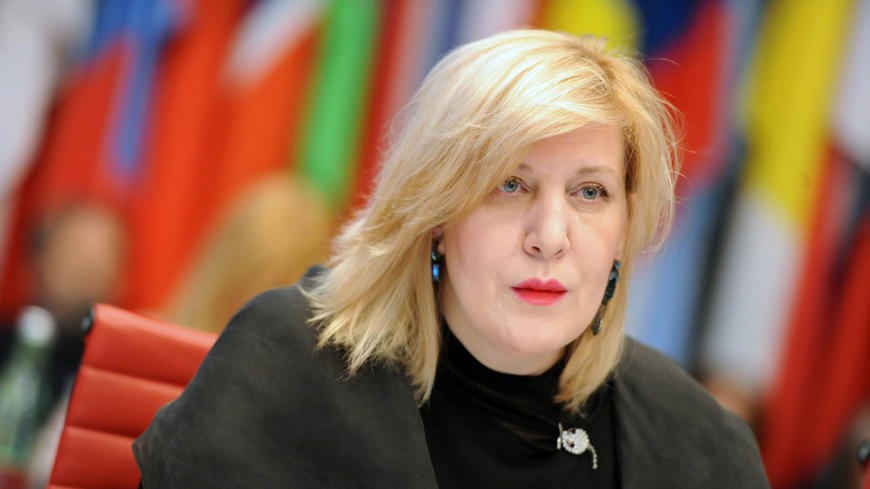The Commissioner delivered a speech today at GANNHRI's Annual Conference on "Ensuring human rights-based and gender-responsive implementation, follow-up and review of the Global Compact for Migration: The role of National Human Rights Institutions".
- Download the speech CommDH/Speech(2019)2 (Pdf)
- Watch the video (Facebook)
Excellencies,
Ladies and Gentlemen,
It is a pleasure to be here and to have the opportunity to address you on this topic that is very important to your work and mine.
You are probably all aware of the highly toxic discussions about the Compact that took place in a number of European countries. This has had little to do with the Compact itself, and everything with the panic, and some would say, paranoia that has taken hold across Europe about anything related to migration.
Without wanting to diminish the achievement of concluding the Compact, as Human Rights Commissioner, my main concern is not so much with the Compact itself. It is rather with the protection and realisation of the human rights of all migrants. Of course, many of these are also reflected in the Compact, but action in this area has never depended and should not depend on the Compact only. They follow from the obligations that states already have, regardless of whether they supported, rejected or were ambivalent about the Compact. So we need to look at this issue also from the perspective of the tools we already have in our international and national institutional frameworks.
When it comes to protecting migrants’ rights, including women and girls, and the role of NHRIs, I think there are two key challenges worth mentioning from a European perspective.
The first is the erosion of the idea that migrants have rights in the first place. The current political climate in Europe is moving more and more towards the dehumanisation of migrants, and therefore the notion that they do not deserve rights. What is worse, it is leading to a perception that those who attempt to cross borders without permission have called upon themselves whatever horrible fate they face, whether it is drowning at sea, being shot at, beaten up, held in detention for prolonged periods, or being deprived of access to basic services, starvation, or forced to live in appalling conditions, rather than seeing these as results of state action.
The second challenge is that states seem to have forgotten how to think about the bigger picture when it comes to migration. The key focus of the current European approach to migration is preventing people from arriving. To this end, many carefully built-up structures are now being dismantled to make Europe as unattractive as possible, including reducing social benefits for migrants in many countries, far-reaching restrictions on the right to family reunification, and other barriers to successful integration. In the long-term, this is not only harming migrants, but is also likely to have a significant negative impact in terms of the economy and social cohesion. Which in turn is likely to fuel further resentment against migrants, which is already rife in Europe.
The same short-term, Eurocentric thinking is driving efforts to get countries of origin and transit to police migration on Europe’s behalf. To prevent migration, European states are willing to spend significant sums of money to entice countries of origin and transit to police migration on their behalf. In some cases, we are already seeing this leading to human rights violations, for which European countries manage to evade legal responsibility. I think this presents a challenge both for NHRIs in Europe and for those in the countries which act as Europe’s partners in this respect.
I will not discuss the specific impact on women and girls in too much detail, since we will no doubt talk more about this during the discussion. I would however say that, the developments I have sketched may particularly impact on women and girls, including by increasing their vulnerability to trafficking, sexual violence and abuse, both on their way to Europe and once they are there.
What does this mean for NHRIs? Firstly, blatant violations of migrants’ rights must be addressed head-on. As soon as we start accepting that push-backs, ill-treatment or long-term detention in bad conditions are now simply ‘part of the game’, the notion that migrants do not deserve rights will have won. This will require further strengthening of NHRIs monitoring work and strategic litigation against regressive measures.
Secondly, investing in communication is crucial. So much of the current situation is driven by highly polarised political and public debates. NHRIs with their expertise and authority can make an important contribution to these debates, but they must be willing and able to be vocal and visible. And in this they will have my full support and solidarity.
Thirdly, NHRIs should use their role as a bridge between civil society and governments to ensure the voices of migrants are heard in legislative and policy-making processes that affect them. Migrants themselves may have difficulty accessing the corridors of power, but NHRIs can help them do so.
Fourthly and finally, advocate for better transparency and accountability in migration policy, especially when it comes to international cooperation activities that may affect migrants’ rights. For example, NHRIs can insist that their governments publish human rights impact assessments of proposed cooperation activities, or can help build capacity to carry out such assessments.
Thank you once again for this opportunity to address you on this issue that will unavoidably stay with us for a long period of time.



